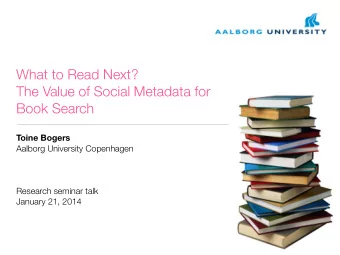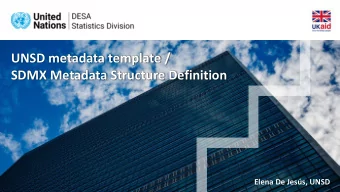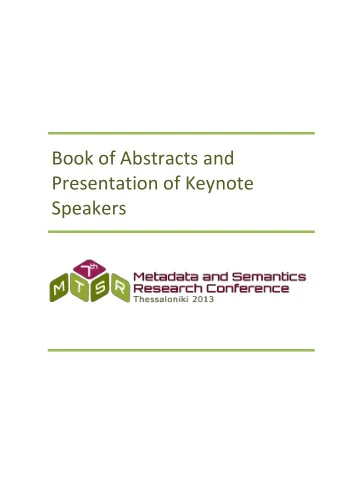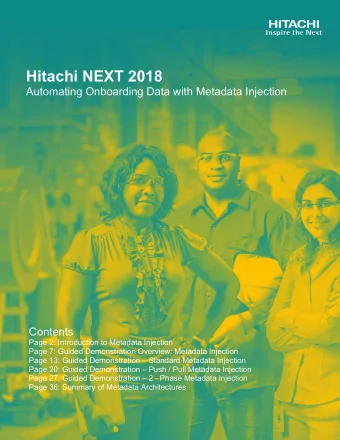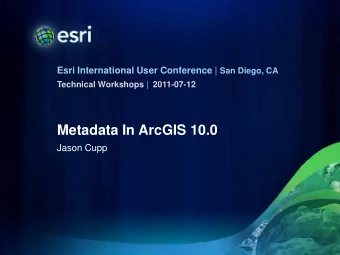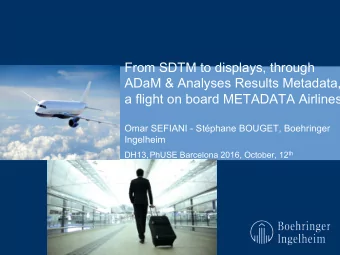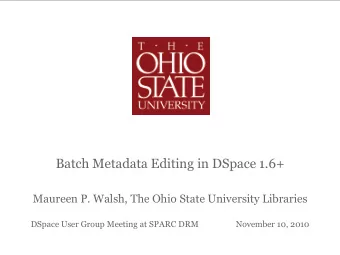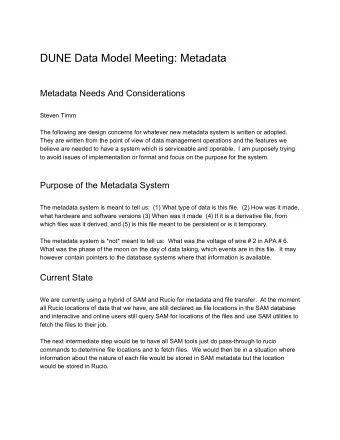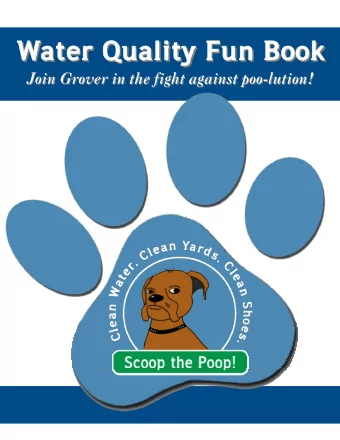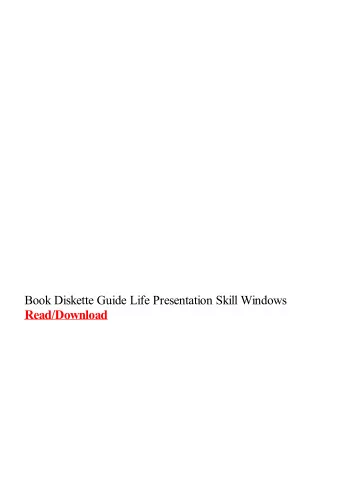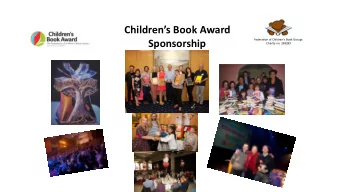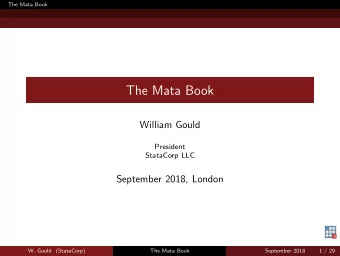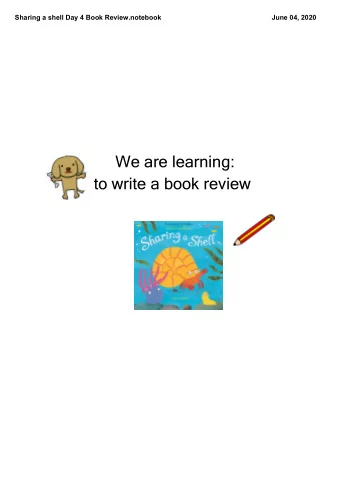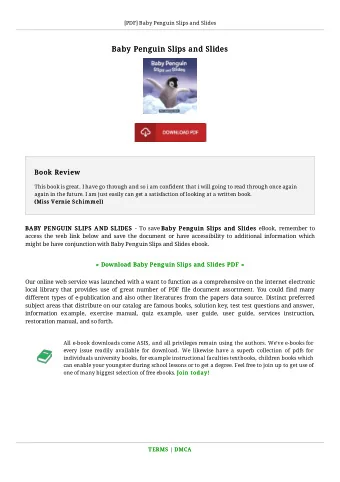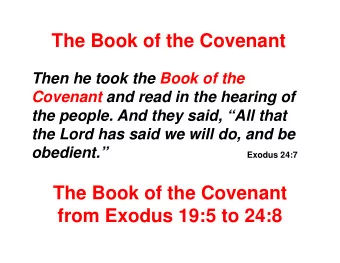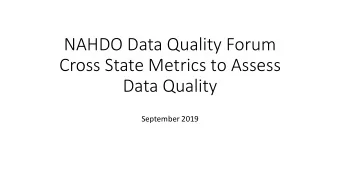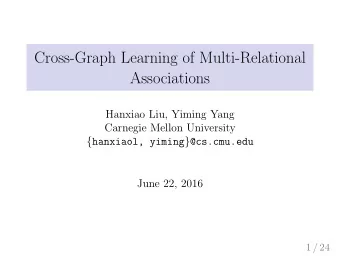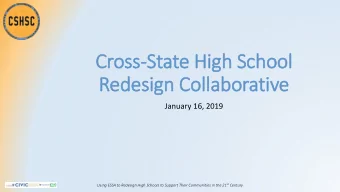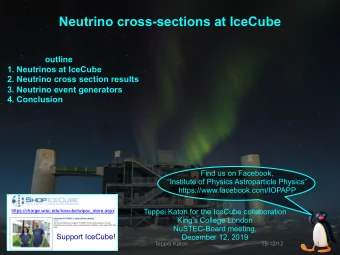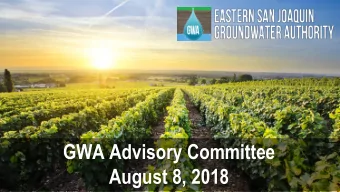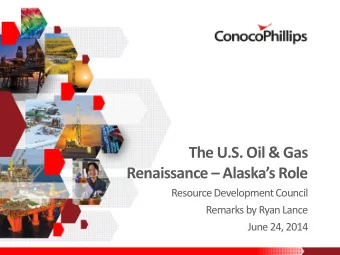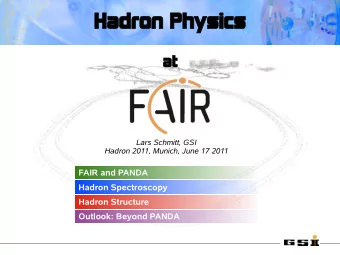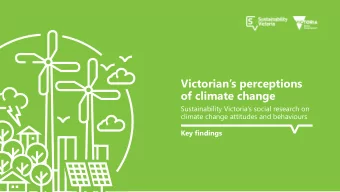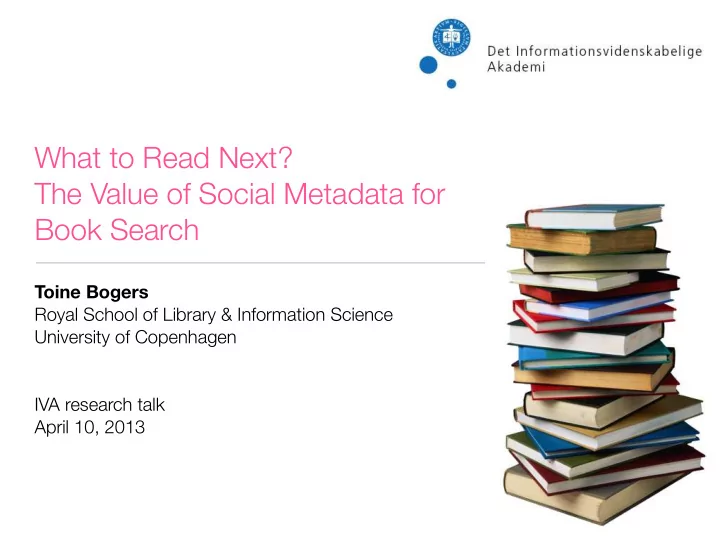
What to Read Next? The Value of Social Metadata for Book Search - PowerPoint PPT Presentation
What to Read Next? The Value of Social Metadata for Book Search Toine Bogers Royal School of Library & Information Science University of Copenhagen IVA research talk April 10, 2013 Outline Introduction Types of book discovery
What to Read Next? The Value of Social Metadata for Book Search Toine Bogers Royal School of Library & Information Science University of Copenhagen IVA research talk April 10, 2013
Outline • Introduction • Types of book discovery • Problem statement & talk focus • Methodology • Results & analysis • Discussion & conclusions 2
Books are not dead (they aren’t even sick!) • Books remain very popular! - No. of books sold: 2.57 billion books in US in 2010 (up by 4.1% from 2008) - Sales revenue: $13.9 billion in US in 2010 (up by 5.8% from 2008) - Sales revenue: up by 11.8% in US from Q1 2011 to Q1 2012 ‣ E-books top-selling category for the first time, at the expense of paperback sales - > 3 million new books published in the US in 2011 • So there is definitely a need for discovering (new) interesting books! 3
Types of book discovery • Search (“ Show me all books about X ”) 4
Bibliotek.dk
Types of book discovery • Search (“ Show me all books about X ”) • Recommendation (“ Show me interesting books! ”) 6
Amazon.com
Types of book discovery • Search (“ Show me all books about X ”) • Recommendation (“ Show me interesting books! ”) - 64% of library patrons are interested in personalized recommendations! 8
Types of book discovery • Search (“ Show me all books about X ”) • Focused recommendation (“ Show me interesting books about X! ”) • Recommendation (“ Show me interesting books! ”) 10
LibraryThing forum topic
Types of book discovery • Search (“ Show me all books about X ”) • Focused recommendation (“ Show me interesting books about X! ”) • Recommendation (“ Show me interesting books! ”) 13
Problem statement & talk focus • Problem statement - How can we provide the best possible focused book recommendations? t o n e r a e w • Research questions o S t ! x e t l u l f t a g n i k o o l 1. How can we ensure recommendations are topically relevant ? Which book metadata is most instrumental in finding relevant books? 2. How can we ensure recommendations are of high quality How do we incorporate taste/opinions into the recommendation process? 3. How can we best combine quality and topicality? 14
Methodology • Topically relevant recommendations → right up the alley of a text search engine ! • What do we need to evaluate a book search engine? - Large collection of book records - Realistic book requests & information needs (= topics ) - Relevance judgments (“ Which books are relevant for which topics? ”) ‣ Need to alleviate some of the problems of system-based evaluation! - Realistic evaluation metric 15
Methodology: Collection of book records • Amazon/LibraryThing collection - Part of the 2011-2013 INEX Social Book Search track - 2.8 million book metadata records ‣ Mix of metadata from Amazon and Librarything ‣ Controlled metadata from Library of Congress (LoC) and British Library (BL) ‣ ISBNs are used as document ID (similar editions linked to the same work) ‣ Balanced mix of fiction and non-fiction - Provides for a natural test-bed for focused recommendation ! 16
Methodology: Collection of book records Amazon + LoC + BL • Different groups of metadata fields • Different grou • Different grou * * * - Title - Blurb - Dewey * - Publisher - Epigraph - Thesaurus * * - Editorial - First words - Index terms Controlled metadata - Creator - Last words - Series - Quotation - Tags Content - Award Tags - Character - User reviews Reviews - Place LibraryThing Metadata 17
Methodology: Topics & relevance judgments • Realistic book requests & information needs - Focused book recommendations can touch upon many different aspects ‣ Users search for topics, genres, authors, plots, etc. ‣ Users want books that are engaging, funny, well-written, educational, etc. ‣ Users have different preferences, knowledge, reading level, etc. - LibraryThing fora contain many such focused requests! 18
Topic title Annotated LT topic Group name Narrative 19
Methodology: Topics & relevance judgments • Realistic book requests & information needs - Focused book recommendations can touch upon many different aspects ‣ Users search for topics, genres, authors, plots, etc. ‣ Users want books that are engaging, funny, well-written, educational, etc. ‣ Users have different preferences, knowledge, reading level, etc. - LibraryThing fora contain many of such focused requests! - Collected 211 different topics from the LibraryThing fora, annotated with ‣ Type (fiction vs. non-fiction) ‣ Subject (same author, subject, series, genre, known item, edition) 20
Methodology: Topics 2% 2% Genre Known-item Edition 2% Series 3% Other 2% 43% 48% 52% 46% Fiction Non-fiction Author Subject 21
Methodology: Relevance judgments • Problem: relevance often judged by students or retired CIA analysts • Solution: take recommendations from LT members 22
Topic title Annotated LT topic Group name Narrative Recommended books 23
Methodology: Relevance judgments • Problem: relevance often judged by students or retired CIA analysts • Solution: take recommendations from LT members - Provided by people interested in the topic, - Free of charge, - Judged both on topical relevance and quality ! • Graded relevance scoring - Relevance score of 1 if suggested by other LT members 24
Catalog additions Forums suggestions added after the topic was posted 25
Methodology: Relevance judgments • Problem: relevance often judged by students or retired CIA analysts • Solution: take recommendations from LT members - Provided by people interested in the topic, - Free of charge, - Judged both on topical relevance and quality ! • Graded relevance scoring - Relevance score of 1 if suggested by other LT members - Relevance score of 4 if added by the topic creator after posting the request 26
Methodology: Evaluation • Main metric: Normalized Discounted Cumulated Gain (NDCG) - Measures the usefulness (gain) of a book in the ranked results list ‣ Scores range between 0.0 and 1.0 - Book ranking matters (as opposed to regular Precision) ‣ Relevant books before non-relevant books - Takes graded relevance judgments into account ‣ Highly relevant books before slightly relevant books, etc. - Evaluated on NDCG@10 (over the first 10 results) 27
Results Set of metadata fields NDCG@10 Metadata 0.2015 Content 0.0115 Controlled metadata 0.0496 Controlled metadata (+LoC, +BL) 0.0691 Tags 0.2056 Reviews 0.2832 All fields 0.3058 All fields (+LoC, +BL) 0.3029 0.0 0.1 0.2 0.3 0.4 NDCG@10 28
Results: Does controlled metadata help? Set of metadata fields NDCG@10 Metadata 0.2015 Content 0.0115 Controlled metadata 0.0496 Controlled metadata (+LoC, +BL) 0.0691 Tags 0.2056 Reviews 0.2832 All fields 0.3058 All fields (+LoC, +BL) 0.3029 0.0 0.1 0.2 0.3 0.4 NDCG@10 29
Results: Tags vs. controlled metadata Set of metadata fields NDCG@10 Metadata 0.2015 Content 0.0115 Controlled metadata 0.0496 Controlled metadata (+LoC, +BL) 0.0691 Tags 0.2056 Reviews 0.2832 All fields 0.3058 All fields (+LoC, +BL) 0.3029 0.0 0.1 0.2 0.3 0.4 NDCG@10 30
Results: Does controlled metadata help? Set of metadata fields NDCG@10 Metadata 0.2015 Content 0.0115 Controlled metadata 0.0496 Controlled metadata (+LoC, +BL) 0.0691 Tags 0.2056 Reviews 0.2832 All fields 0.3058 All fields (+LoC, +BL) 0.3029 0.0 0.1 0.2 0.3 0.4 NDCG@10 31
Results: Does controlled metadata help? Set of metadata fields NDCG@10 Metadata 0.2015 Content 0.0115 Controlled metadata 0.0496 Controlled metadata (+LoC, +BL) 0.0691 Tags 0.2056 Reviews 0.2832 All fields 0.3058 All fields (+LoC, +BL) 0.3029 0.0 0.1 0.2 0.3 0.4 NDCG@10 32
Results: Fiction vs. non-fiction Non- Metadata fields Fiction fiction Metadata 0.2297 0.1798 Controlled metadata 0.0998 0.0461 Tags 0.1804 0.1576 Reviews 0.2975 0.2671 All fields 0.3228 0.2806 0.0 0.1 0.2 0.3 0.4 Note: ‘Content’ left out, ‘Controlled metadata’ NDCG@10 and ‘All fields’ is w/ LoC and BD metadata 33
Results: Author vs. subject Metadata fields Author Subject Metadata 0.2600 0.1795 Controlled metadata 0.1628 0.0529 Tags 0.1738 0.1629 Reviews 0.4170 0.2499 All fields 0.4095 0.2697 0.0 0.1 0.2 0.3 0.4 Note: ‘Content’ left out, ‘Controlled metadata’ NDCG@10 and ‘All fields’ is w/ LoC and BD metadata 34
Results: Author vs. subject Metadata fields Author Subject Metadata 0.2600 0.1795 Controlled metadata 0.1628 0.0529 Tags 0.1738 0.1629 Reviews 0.4170 0.2499 All fields 0.4095 0.2697 0.0 0.1 0.2 0.3 0.4 Note: ‘Content’ left out, ‘Controlled metadata’ NDCG@10 and ‘All fields’ is w/ LoC and BD metadata 35
Results: Tags vs. controlled metadata Set of metadata fields NDCG@10 Metadata 0.2015 Content 0.0115 Controlled metadata 0.0496 Controlled metadata (+LoC, +BL) 0.0691 Tags 0.2056 Reviews 0.2832 All fields 0.3058 All fields (+LoC, +BL) 0.3029 0.0 0.1 0.2 0.3 0.4 NDCG@10 36
Recommend
More recommend
Explore More Topics
Stay informed with curated content and fresh updates.
